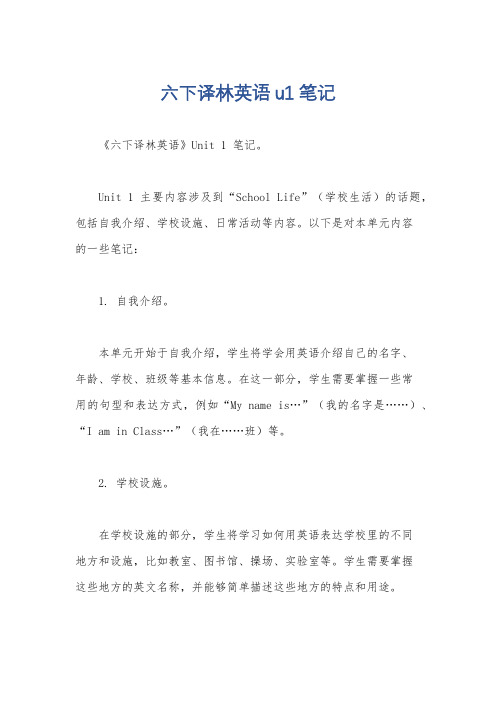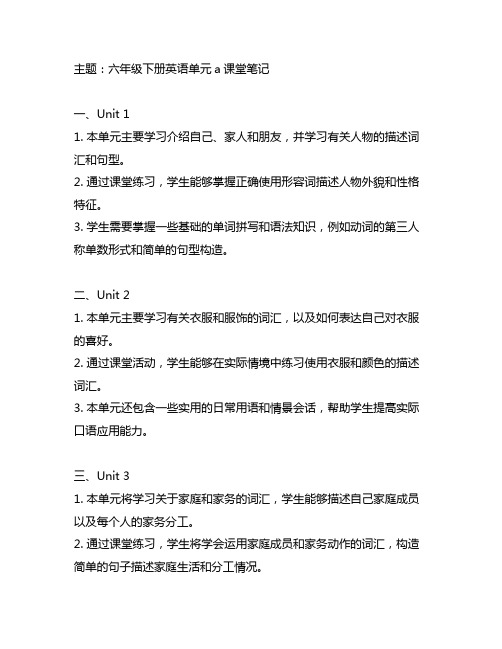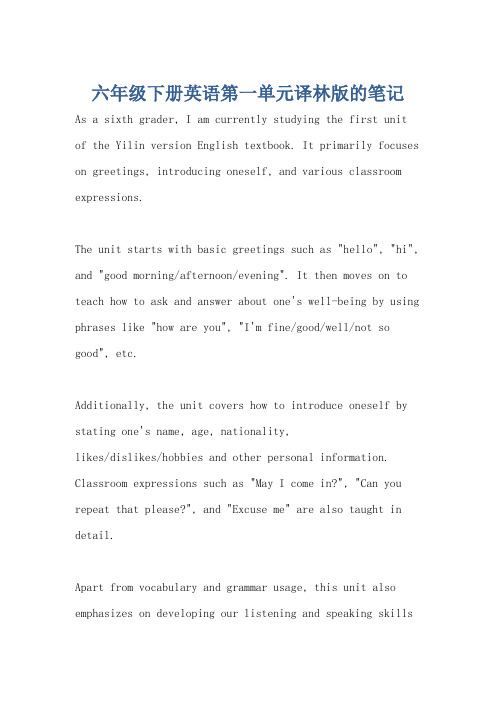六年级下册英语第一单元笔记
六下英语第一单元笔记冀教版

六下英语第一单元笔记冀教版Title: Notes on the First Unit of Grade Six English (Hebei Edition)IntroductionAs we embark on the journey of learning English in grade six, the first unit serves as a foundation for the entire year. It introduces us to fundamental concepts and skills that will be built upon throughout our learning process. The unit covers topics such as greetings, introductions, daily routines, and school life, all essential in building a strong foundation in communication. VocabularyThe first unit introduces a range of vocabulary related to greetings, self-introduction, and daily activities. Key words and phrases include "hello," "hi," "my name is," "nice to meet you," "how are you?," "I'm fine, thank you," "good morning," "good afternoon," "good evening," "see you," and "goodbye." Additionally, we learn about words related to school life, such as "classroom," "teacher," "student," "book," "pencil," "eraser," and "ruler."GrammarIn terms of grammar, the first unit focuses on basic sentence structure and the formation of simple sentences. We learn about the subject-verb-object structure and how to use nouns, verbs, and adjectives correctly. We alsopractice forming sentences using the present tense, whichis essential for describing actions and states that are happening in the present.Dialogues and ConversationsThe unit includes several dialogues and conversations that help us practice using the new vocabulary and grammar in real-life situations. These dialogues typically involve two or more characters greeting each other, introducing themselves, and asking about each other's well-being. Through these conversations, we learn how to initiate and maintain basic conversations in English.Listening and Speaking ActivitiesTo enhance our listening and speaking skills, the unit incorporates various activities. These include listening to recordings of conversations and answering questions aboutwhat was heard, role-playing dialogues with classmates, and participating in speaking games and quizzes. Theseactivities help us develop our ability to understand spoken English and express ourselves fluently.Reading and WritingIn addition to listening and speaking, the first unit also introduces reading and writing skills. We read short texts that are relevant to the unit's topics, such asstories about school life or descriptions of daily routines. We also learn to write simple sentences and paragraphsabout ourselves, our families, and our daily activities.Cultural AwarenessAn important aspect of learning English is developing cultural awareness. The first unit introduces us to some basic cultural practices and customs related to greetings and introductions in English-speaking countries. We learn about the importance of using appropriate greetings and introductions in different situations and how these canvary from one culture to another.ConclusionIn conclusion, the first unit of grade six English (Hebei Edition) provides a comprehensive introduction to the fundamentals of English language learning. It covers vocabulary, grammar, listening, speaking, reading, writing, and cultural awareness, all essential in building a solid foundation for further study. By mastering the content of this unit, we will be well-prepared to tackle more complex topics and skills in the subsequent units of the year.。
六下译林英语u1笔记

六下译林英语u1笔记
《六下译林英语》Unit 1 笔记。
Unit 1主要内容涉及到“School Life”(学校生活)的话题,包括自我介绍、学校设施、日常活动等内容。
以下是对本单元内容
的一些笔记:
1. 自我介绍。
本单元开始于自我介绍,学生将学会用英语介绍自己的名字、
年龄、学校、班级等基本信息。
在这一部分,学生需要掌握一些常
用的句型和表达方式,例如“My name is…”(我的名字是……)、“I am in Class…”(我在……班)等。
2. 学校设施。
在学校设施的部分,学生将学习如何用英语表达学校里的不同
地方和设施,比如教室、图书馆、操场、实验室等。
学生需要掌握
这些地方的英文名称,并能够简单描述这些地方的特点和用途。
3. 日常活动。
本单元还涉及到学生的日常活动,如上学、放学、课间休息等。
学生需要学会用英语表达这些日常活动,并能够就自己的日常活动
进行简单的口头描述。
总的来说,本单元的重点是让学生学会用英语介绍自己和学校
的基本信息,以及描述日常活动和学校设施。
通过学习本单元的内容,学生将能够在简单的日常交流中运用所学知识,提高他们的英
语口语表达能力。
以上是对《六下译林英语》Unit 1内容的简要笔记,希望对你
有所帮助。
人教版PEP六年级英语下册第一单元知识点归纳

人教版PEP六年级英语下册第一单元知识点归纳六年级下册第一单元知识点归纳四会单词:tall—taller更高的 short—shorter 更矮的 strong—stronger更强壮的old—older 年龄更大的young—younger 更年轻的big—bigger更大的heavy—heavier 更重的 long—longer 更长的 thin—thinner 更瘦的 small—smaller (体型)更小的四会句型:How tall are you? 你有多高?I’m 164 cm tall.我164 厘米高。
You’re shorter than me. 你比我矮。
You’re 4 cm taller than me.你比我高4厘米。
How heavy are you? 你有多重?I’m 48 kg.我48千克。
应该掌握的知识点:1、表示两者之间有所比较时,句子中的形容词要用比较级形式。
形容词变为比较级的变化规则:(1)一般情况下,在形容词的词尾直接加er。
如: tall—taller short—shorter.(2)以字母e结尾的形容词,在词尾直接加r,如:nice—nicer. late—later (3)以重读闭音节结尾,且结尾只有一个辅音字母的词,先双写这个辅音字母,再加er.如:big—bigger thin—thinner fat—fatter (4)以辅音字母加y结尾的双音节形容词,先变y 为i , 再加er。
如:easy—easier heavy—heavier funny—funnier.形容词比较级的变化口诀原级变为比较级,通常er加上去。
若是结尾辅元辅,辅音双写要牢记。
辅音加y结尾时,把y变i 是必须。
原级若以e结尾,直接加r不后悔。
2、部分形容词比较级的不规则变化:good—better well—better bad—worse badly—worse many—more much—more little—less far—farther3、同义句:How tall are you?==What’s your height?How heavy are you?==What’s your weight?4、以How开头的问句(仅限小学阶段):How are you? 问身体状况。
六年级下册英语笔记第一单元外研版

六年级下册英语笔记第一单元外研版English:In the first unit of the sixth grade English textbook, we learned about expressing likes and dislikes, describing past experiences, and talking about past habits. We studied vocabulary related to leisure activities and pastimes, as well as grammar structures such as the past continuous tense and the simple past tense. We also practiced how to use adverbs of frequency to talk about past habits. Through various reading and speaking activities, we were able to practice using these language points in context and improve our communication skills. Additionally, we were introduced to different cultures and customs through the reading materials, which broadened our perspectives and understanding of the world around us.Chinese:在六年级英语教科书的第一个单元中,我们学习了表达喜好和不喜欢,描述过去的经历,以及谈论过去的习惯。
我们学习了与休闲活动和消遣相关的词汇,以及语法结构,如过去进行时和一般过去时。
六年级下册英语笔记人教版第一单元

六年级下册英语笔记人教版第一单元English: In the first unit of the sixth grade English textbook, students learn about different countries and cultures. They study the names of countries, nationalities, and languages, as well as learn how to greet people and ask about their nationality. They also learn about different national flags and their meanings. Additionally, students explore the topic of festivals around the world, such as Chinese New Year and Thanksgiving, and learn about the customs and traditions associated with these festivals. Through these lessons, students gain a deeper understanding and appreciation for the diversity of cultures and customs in the world.Chinese Translation: 在六年级英语教材的第一单元中,学生学习了解不同的国家和文化。
他们学习国家的名称、国籍和语言,学会如何问候别人并询问他们的国籍。
他们还学习了解不同国家的国旗及其含义。
此外,学生们探索了世界各地的节日主题,如中国新年和感恩节,并了解了与这些节日相关的习俗和传统。
通过这些课程,学生们对世界各地文化和习俗的多样性有了更深入的了解和欣赏。
六年级下册英语的单元a部分课堂笔记

主题:六年级下册英语单元a课堂笔记一、Unit 11. 本单元主要学习介绍自己、家人和朋友,并学习有关人物的描述词汇和句型。
2. 通过课堂练习,学生能够掌握正确使用形容词描述人物外貌和性格特征。
3. 学生需要掌握一些基础的单词拼写和语法知识,例如动词的第三人称单数形式和简单的句型构造。
二、Unit 21. 本单元主要学习有关衣服和服饰的词汇,以及如何表达自己对衣服的喜好。
2. 通过课堂活动,学生能够在实际情境中练习使用衣服和颜色的描述词汇。
3. 本单元还包含一些实用的日常用语和情景会话,帮助学生提高实际口语应用能力。
三、Unit 31. 本单元将学习关于家庭和家务的词汇,学生能够描述自己家庭成员以及每个人的家务分工。
2. 通过课堂练习,学生将学会运用家庭成员和家务动作的词汇,构造简单的句子描述家庭生活和分工情况。
3. 本单元还将通过课堂游戏和角色扮演,帮助学生提高口语交流能力和团队合作能力。
四、Unit 41. 本单元将学习有关食物和饮料的词汇,学生能够描述自己喜欢的食物和饮料,并表达食物的口感和味道。
2. 通过课堂活动,学生将学会在实际情境中讨论食物偏好,并学习一些常用的餐厅用语和点餐对话。
3. 本单元还包含一些与食物相关的文化知识和风俗习惯,帮助学生了解不同国家和地区的饮食习惯和饮食文化。
五、Unit 51. 本单元将学习有关动物和自然界的词汇,学生能够描述自己喜欢的动物和环保意识。
2. 通过课堂练习,学生将学会用英语描述动物的外貌特征和生活习性,并能够参与有关动物保护和环保的讨论。
3. 本单元还将通过学习一些与自然和环境保护相关的诗歌和歌曲,帮助学生了解自然界的美好并培养环保意识。
通过以上的课堂笔记,我们可以清晰地了解到六年级下册英语单元a的课程安排和学习目标。
这些内容涵盖了学生在日常生活中所需要用到的基础英语词汇和语法知识,同时也注重培养学生的口语交流能力和团队合作意识。
希望学生们能够在老师的指导下,认真学习每个单元的内容,积极参与课堂活动,提高英语水平,为将来的学习和工作打下坚实的基础。
苏教版六年级下册英语第一单元课文笔记

苏教版六年级下册英语第一单元课文笔记Lesson 1-Lesson21.waslwoz:弱waz]是(is,am的过去式)2.holiday[holad]假日:节日3.diary[daiari]日记4.fantastic[fen'testik]奇异的:极好的:了不起的5.city【sit]城市6.back[bek]n.背部:后面adv.向后地adj.后面的7.coconutfkoukan]椰子8.spend[spend]花费(过去式为spent)9.eve fi:v]前夜:前夕10.programme[prougrem]程序:节目:计划,规划11.excitinglik'saitin]使人激动的,令人兴奋的12.delicious[di'lifas]美味的13.wonderfullwAndafu]令人惊奇的:奇妙的14.werelwa:]是(are的过去式)15.during['djuarin]在厖.期间16.travel[trev]旅行:长途旅行17.enjoy fin'ds]喜爱:享有:欣赏18.interesting[intristin]有趣的:引起兴趣的19.to[强tu:,弱tu]到?,往.?,向?20.cat[i:t]吃(过去式为atc)Leson 3-Lesson41.yesterday[jestadi]昨天:在昨天2.bookshop[buk2p]书店(英国英语)bookstorefbukstb.]书店(美国英语)st la:st]最后的:最近;最后来的人或发生的事情:持续4.shop[U3p]商店;在商店购物5.interested[intristid]感兴趣的6.movie[mu:vi]电影(近义词:film)7.lile[lit]一点儿:稍许8.cartoon[ka:tu:n]卡通片:动画片9.call[k2.]打电话叫.?;称呼;把.?叫做10.about la'baut]大约,左右;关于,对于11.museum[mju:'ziam]博物馆12.home[haum]在家:到家13.time[taim]时间(不可数名词):次数(可数名词):倍数(可数名词)14.buy[bai]买(过去式为bought)Lesson 5.L.esson61.borm[b2:n]出生:天生(在某方面才能)的2.whenthwen]在那时:何时:当..?时3.age leid]年龄4.date ldeit]日期;日子:约会:约见5.birth[ba:]出生:诞生;分娩6place[pleis]地点:位置:场所:区域;席位:名词7.same[seim]同样的:同一的:相同的8.as[ez]conj.因为;依照;当.时;随着:虽然prep.当作:以?的身份:如同adv.同样地:和..,一样的9.ill[]有病的:不健康的同义词:sick比较级:worse最高级:worst10.Einstein 爱因斯坦(Albert Einstein)11.Andersen 安徒生(Hans Christian Anderson,丹麦的童话作家)12.grandma[grendma:]奶奶:外婆13.physics fiziks]物理学14.essay[ese]散文;随笔Revision(Unit One)1.library[laibrar]图书馆;藏书楼2.spotlsp]点:斑点:看见(到):注意到:辨认:发现3.gymldsim]体育馆4.over'auva]结束;在.?上方(面)(指垂直的上方)5.oilet[toilit]厕所;卫生间6.angry[【engr]生气的:发怒的7.care[kea]小心:谨慎;关心;照顾8.suddenly'sAdnl]突然地。
六年级下册英语第一单元译林版的笔记

六年级下册英语第一单元译林版的笔记As a sixth grader, I am currently studying the first unit of the Yilin version English textbook. It primarily focuses on greetings, introducing oneself, and various classroom expressions.The unit starts with basic greetings such as "hello", "hi", and "good morning/afternoon/evening". It then moves on to teach how to ask and answer about one's well-being by using phrases like "how are you", "I'm fine/good/well/not so good", etc.Additionally, the unit covers how to introduce oneself by stating one's name, age, nationality,likes/dislikes/hobbies and other personal information. Classroom expressions such as "May I come in?", "Can you repeat that please?", and "Excuse me" are also taught in detail.Apart from vocabulary and grammar usage, this unit also emphasizes on developing our listening and speaking skillsthrough various activities such as role-play exercises with peers and teacher-led dialogues.Overall, this first unit of the Yilin version English textbook has laid a strong foundation for us learners to improve our communication skills in English.。
- 1、下载文档前请自行甄别文档内容的完整性,平台不提供额外的编辑、内容补充、找答案等附加服务。
- 2、"仅部分预览"的文档,不可在线预览部分如存在完整性等问题,可反馈申请退款(可完整预览的文档不适用该条件!)。
- 3、如文档侵犯您的权益,请联系客服反馈,我们会尽快为您处理(人工客服工作时间:9:00-18:30)。
六年级下册英语第一单元笔记
一、单元主题与核心词汇
本单元主题为“学校生活”,主要围绕学校日常活动、课程、课外活动等内容展开。
核心词汇包括学科名称(如math, science, English等)、学校设施(如library, playground 等)、学校日常活动(如have classes, do homework等)以及相关的动词和形容词。
二、重点句型和语法结构
一般现在时第三人称单数形式
结构:主语(第三人称单数)+ 动词第三人称单数形式(+ 其他)
用法:描述经常性、习惯性的动作或状态。
动词变化规则:一般在动词后加-s或-es;以ch, sh, s, x, o 结尾的动词加-es;以辅音字母+y结尾的动词,变y为i再加-es。
举例:
She usually reads books after dinner.
He watches TV every evening.
My brother studies hard at school.
询问和回答日常活动
询问句型:What do you usually do after school?
回答句型:I usually [动词原形] after school.
举例:
Q: What do you usually do after school?
A: I usually play football with my friends.
描述课程与活动喜好
结构:I like [学科/活动] because [原因].
举例:
I like English because it's interesting.
My sister loves PE class because she can play sports.
三、重点词汇及短语
学科名称
Math 数学
Science 科学
English 英语
Chinese 语文
PE 体育
Art 美术
Music 音乐
学校设施
Library 图书馆
Playground 操场
Classroom 教室
Gym 体育馆
Laboratory 实验室
日常活动
Have classes 上课
Do homework 做作业
Play sports 进行体育运动
Read books 读书
Watch TV 看电视
其他常用词汇
Fun 有趣的
Difficult 困难的
Favorite 最喜欢的
Enjoy 喜欢
Interesting 有趣的
Bored 无聊的
四、扩展内容与练习题
1. 扩展内容
学习更多关于学校生活的词汇和表达,如学校规则、课外活动、同学关系等。
了解不同国家学校的异同,比如上课时间、课程设置等。
2. 练习题
填空题
I like _______ (科学) because it's very interesting.
After school, I often go to the _______ (图书馆) to read books.
选择题
What _______ your favorite subject?
A. am
B. is
C. are
He _______ basketball every afternoon.
A. play
B. plays
C. playing
翻译题
你通常在放学后做什么?(What do you usually do after school?)
我最喜欢数学,因为它很有用。
(My favorite subject is math, because it's very useful.)
写作题
描述你的一天学校生活,包括你喜欢的课程和原因。
五、单元总结
本单元主要围绕学校生活展开,通过学习我们掌握了描述学校日常活动、课程喜好以及使用一般现在时第三人称单数形式的表达能力。
通过丰富的词汇和句型练习,我们能够更流利地表达自己在学校的活动和感受。
同时,扩展内容也让我们对学校生活有了更全面的了解。
希望同学们能够在实际生活中运用所学知识,更好地与他人交流,分享自己的学校生活。
